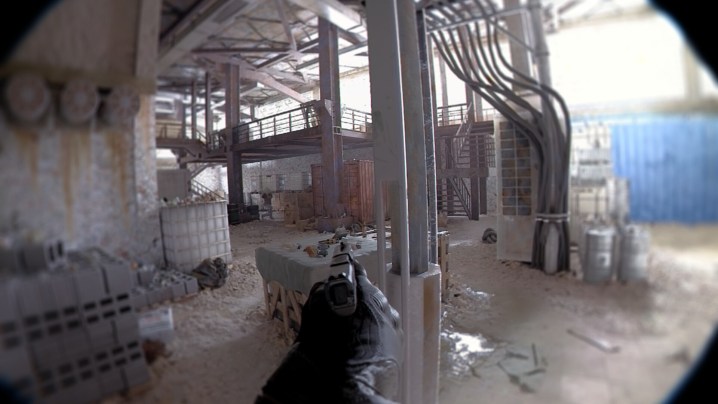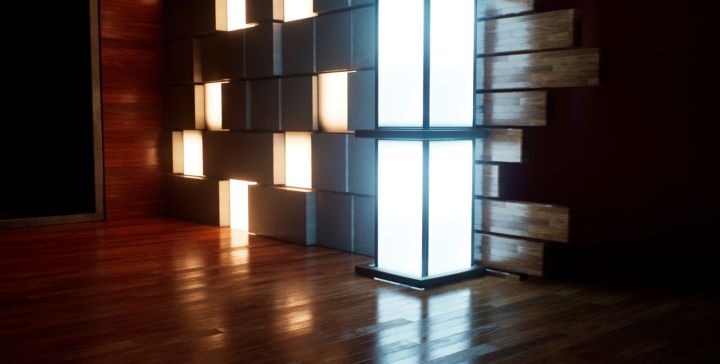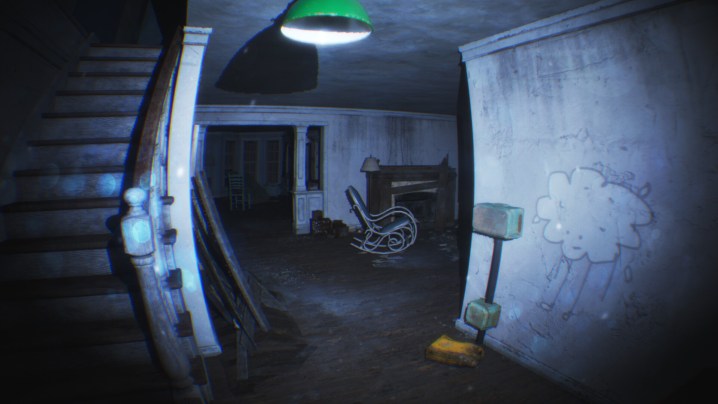
It’s difficult for small game developers to make an impact in 2023, but Unrecord, a bodycam-style first-person shooter developed by the French game studio Drama, took the internet by storm over the past week. The first gameplay demo looked impossibly realistic, so much so that hundreds of heated opinions were quick to call the trailer fake.
It’s not, as proved by in-engine footage showcased by one of the developers. But it’s still hard to believe just how realistic Unrecord looks, and there’s a very good reason for that.
Hiding imperfections
First early gameplay trailer for “UNRECORD”, the bodycam FPS. Wishlist on steam now!@unrecordgame pic.twitter.com/gVa7q0YOGu
— Alexandre Spindler (@esankiy) April 19, 2023
You can see the demo, posted by programmer and co-director of Unrecord Alexandre Spindler, above. If it weren’t for some choppy animations, it would be easy to fool someone into thinking this was real footage. That’s certainly the assumption a lot of viewers came away with.
It’s perspective that makes the difference, according to the developer of another game, Paranormal Tales, a bodycam-style horror game slotted for a 2023 release. “Footage from bodycam perspectives has become ever more prevalent over the last few years … it’s given us as developers a lot more material for hunting through to figure out just the right positioning and how, exactly, the camera should be moving.”
we're making a hyper-realistic bodycam horror game in unreal engine 5.
you must find your lost dog in a pitch black forest. pic.twitter.com/PHjJtEKjj1
— Paranormal Tales – Wishlist on Steam (@DontPlayPT) April 19, 2023
That’s doing a lot of the heavy lifting for Unrecord. The only other time we see this type of bodycam footage is when it’s real. And especially in the U.>S, the public has seen far too much of it.
Movement is one area, but the quality of footage from a bodycam also plays a role. The developer of Paranormal Tales explained, “We’re trying to stay reminiscent of the video quality you’d see from an actual body camera, which means a layer of textured noise from a lower-quality sensor and a little fish-eye to give the wideness of the shot.”
It seems Unrecord took that sentiment to the extreme. There’s a steep fish-eye and a ton of bloom around the brightest parts of the scene. Any time you see the sky, it’s completely washed-out in white, accounting for the limited dynamic range of a real bodycam.

Above all else, though, what sells Unrecord are the encoding artifacts. It’s important to remember that Unrecord went viral on Twitter, which is a platform notorious for low-quality video. That doubles down on making Unrecord look far more realistic, as it’s already trying to emulate a low-quality camera. If you download the high-quality demo, it’s a lot more obvious this is a game and not a real recording.
Even if you can spot the imperfections in high-quality footage, there’s an art to slathering a game in a layer of grime to more accurately emulate real life. That only works if you have high-quality assets and lighting, though, which is where Unreal Engine 5 comes into play.
The Unreal Engine 5 difference

We haven’t seen a ton of Unreal Engine 5 games yet, but I’ve already covered its potential in the past. A big reason why the new engine is so impressive is Lumen, and I suspect that’s at the heart of photorealism in Unrecord.
If you’re unfamiliar, Lumen is a software-based ray tracing solution. Normally, software-based ray tracing is far inferior to ray tracing run on dedicated accelerators available on graphics cards, but Lumen was created to make software ray tracing more efficient. It combines ray tracing with more traditional lighting techniques, and does so in a highly efficient manner. That’s why Fortnite with Lumen can run on current-gen consoles at 60 frames per second (fps).
I’ve reached out to the developer of Unrecord for clarity, but I’d be shocked if the game wasn’t leveraging Lumen in some way. And that lighting makes the difference. High-quality assets are easy to find with Unreal Engine — one developer even claims the demo was made with assets from the Unreal Marketplace — so it comes down to lighting and the camera to sell the realism of a scene.
According to the Paranormal Tales team, a narrow focus on photorealism can pay off. “We’re leaning very heavily on the features available to us in the engine from the outset and learning how to leverage them to the max. We’ve spent a lot more time getting to grips with real lighting profiles and replicating those in Lumen, which has led to a result that looks more physically correct.”

The team also pointed to a lack of AI and a “constrained environment” as keys to maintaining performance with such high visual fidelity. We don’t have a lot to go on for Unrecord, but in the first trailer, it doesn’t seem as though the game has a massive scope, either.
Beyond providing better tools to achieve photorealism, the team behind Paranormal Tales says Unreal Engine 5 has “been a change of the guard” compared to the previous version. “Things that have been problematic in our experience have been thrown out wholesale and replaced with simpler and more structurally sound alternatives.”
With the “technical debt chopped away,” the new engine seems particularly well-suited for getting games up and running quickly. The Paranormal Tales team says that only time will tell if the additions stand up to years of iteration, but at the moment, Unreal Engine 5 seems better suited for production compared to the later iterations of Unreal Engine 4.
When realism matters
Between Paranormal Tales and Unrecord, it’s clear a new wave of developers are tapping into a perspective that leads to more photorealistic results. It’s an exciting time for PC graphics, as games start to enter an uncanny valley of realism, but it also carries a clear concern. And Unrecord put that on full display.
For those who thought Unrecord was fake or a video, sorry. 😌 pic.twitter.com/41ESKMISy1
— Alexandre Spindler (@esankiy) April 20, 2023
A trained eye can still spot when a game is a game, but Unrecord looks just good enough that, with a heavy layer of Twitter compression, it was able to fool legions of gamers into incorrectly assuming it was real footage. I don’t need to spell out how that could be problematic, especially considering the subject matter of Unrecord.
There’s plenty of discussion around that topic, and the developer has posted an FAQ attempting to clarify its stance. It’s true that this level of realism can be problematic, but it doesn’t look like any of that is stemming from the Unrecord development team.
It shouldn’t distract from the work that smaller studios are taking on to achieve higher levels of photorealism, either. With a leaner, meaner engine offering tools like Lumen to developers, along with a unique perspective and robust marketplace of high-quality assets, we’re seeing a major jump in just how realistic games can look.
This article is part of ReSpec – an ongoing biweekly column that includes discussions, advice, and in-depth reporting on the tech behind PC gaming.




